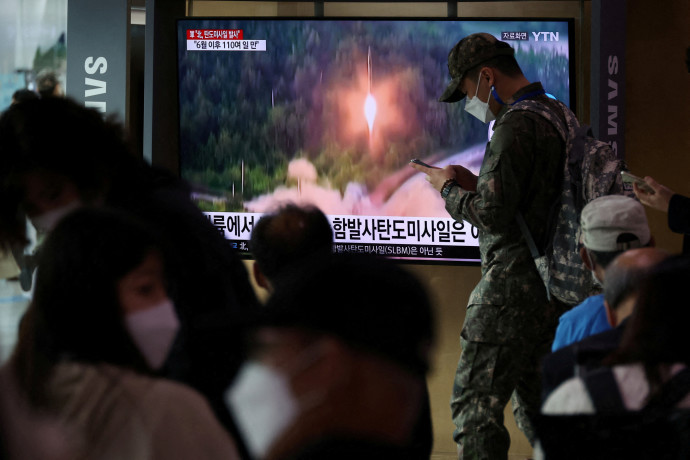North Korean leader Kim Jong Un pledged to counter US nuclear threats with nuclear weapons as he inspected a test of the country's new intercontinental ballistic missile, state media KCNA said on Saturday.
The isolated country fired an intercontinental ballistic missile (ICBM) toward the East Sea on Friday, the South Korean military said, in protest over the United States' move to reinforce its "extended deterrence" protection of South Korea and Japan.
Attending the site with his daughter and wife, Kim said threats from the United States and its allies pursing a hostile policy prompted his country to "substantially accelerate the bolstering of its overwhelming nuclear deterrence.”
"Kim Jong Un solemnly declared that if the enemies continue to pose threats ... our party and government will resolutely react to nukes with nuclear weapons and to total confrontation with all-out confrontation," the official KCNA news agency said.
The launch is presumed to have involved the Hwasong-17 ICBM, according to Yonhap, the same ICBM was test-fired on Novermber 3, but the launch was seen as a failure.

"Kim Jong Un solemnly declared that if the enemies continue to pose threats ... our party and government will resolutely react to nukes with nuclear weapons and to total confrontation with all-out confrontation."
KCNA statement
The launch of the Hwasong-17 ICBM was confirmed by the north and was part of "top-priority defense-building strategy" aimed at building "the most powerful and absolute nuclear deterrence," KCNA said, calling it "the strongest strategic weapon in the world."
The missile flew nearly 1,000 km (621 miles) for about 69 minutes and reached a maximum altitude of 6,041 km, KCNA said.
The Hwasong-17 ICBM was called a "monster" of a missile for its sheer size. It is able to carry multiple warheads and has a range of around 15,000 km, according to North Korea, long enough to reach the entire US mainland.
"North Korea's ICBM launch this time is a significant provocation and serious act of threat that undermines peace and stability not only on the Korean Peninsula but also in the international community and a clear violation of UN Security Council resolutions," the JCS said in a text message sent to reporters, according to Yonhap.
North Korea has conducted a record number of missile tests this year, and also fired hundreds of artillery shells into the sea more recently as South Korea and the United States staged exercises, some of which involved Japan.
South Korea strengthens extended deterrence measures
South Korean President Yoon Suk-yeol instructed the National Security Council on Friday to implement strengthened extended deterrence measures following North Korea's launch, according to Korean media.
"President Yoon ordered a strengthening of the South Korea-US combined defense posture, active implementation of measures to strengthen the executability of the extended deterrence against North Korea agreed between South Korea and the US, and a strengthening of security cooperation between South Korea, the US and Japan," the presidential office said.
Yoon also ordered action for strong condemnation and sanctions against the North, including a UN Security Council response, together with the United States and the international community, according to the South Korean presidential office.
United Nations Security Council will discuss North Korea
The White House strongly condemned the ICBM launch and US President Joe Biden has been briefed on the North's latest provocation.
"This launch is a brazen violation of multiple UN Security Council resolutions and needlessly raises tensions and risks destabilizing the security situation in the region," the White House said in a statement. "The United States will take all necessary measures to ensure the security of the American homeland and Republic of Korea and Japanese allies."
The United Nations Security Council will discuss North Korea in a meeting on Monday, according to its schedule, after Pyongyang's ICBM test fire.
A senior US administration official said earlier that North Korea's latest missile test was of a "longer range missile ... that can hit many, many countries," and said the United Nations security council should meet to discuss it.
